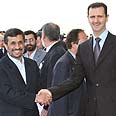
Ahmadinejad: Resistance to West rising
After meeting briefly with his counterpart Assad at Damascus airport, Iranian president declares resistance to West on the rise in Middle East, says region's countries will 'disrupt' American and Israeli plans to change its political geography
The brief meeting, which took place at Damascus airport in the presence of Syrian Foreign Minister Walid Moallem, came two days after a US envoy sought support in Damascus for Washington's latest peace push.
"The front of resistance is increasing in the region, (and) the people of the region support the policy" pursued by the Iranian and Syrian governments, Ahmadinejad said.
"We have achieved a great victory because we were able to defeat the enemy plans to change" the political map in the Middle East, the Iranian hardliner told reporters before departing the Syrian capital.
According to Iran's president, Middle Eastern countries will "disrupt" American and Israeli plans to change the political geography of the region, appearing to brush aside US efforts to forge a regional peace deal between Israel and its neighbors.
"Those who want to change the political geography of the region must know that they will have no place in the future of the region," Ahmadinejad was quoted as saying by Iran's state-run news agency IRNA.
"The waves of free nations to join this resistance is spreading every day," he said.
Before departing Tehran, Ahmadinejad told reporters Iran's relations with Syria were "solid and strategic with a unified view on all issues."
US interested in comprehensive peace
On Thursday, US Middle East envoy George Mitchell said in Damascus that Washington was interested in a comprehensive resolution of the regional conflict that included peace between Syria and Israel.
Mitchell said that for Washington a Middle East peace deal meant an "agreement between Israel and the Palestinians, between Israel and Syria and between Israel and Lebanon and the full normalization of relations between Israel and its neighbors."
"There are some who are determined to disrupt this process. But we are determined to see it through," the US envoy stressed.
Despite a 1949 armistice agreement, Syria and Israel remain technically in a state of war.
The Golan Heights has been at the core of the Syrian-Israeli conflict since it was seized by the Jewish state in the 1967 Six-Day War and annexed in 1981 in a move not recognized by the international community.
Ahmadinejad last visited Syria in February, soon after US Secretary of State Hillary Clinton underlined Washington's desire to see Syria move away from Iran.
At the time, Ahmadinejad and Assad signed a visa-scrapping accord that signaled even closer ties.
An Iranian diplomatic source said earlier on Saturday that during their meeting, Ahmadinejad and Assad reaffirmed their strong ties and "commitment to continue consultations ... in areas of interest."
The pair expressed the need "to raise the level of economic cooperation, particularly in the fields of oil, gas, railways and tourism," according to Syria's official SANA news agency.
They also stressed it was important that Iraqi political groups soon find a way to form a coalition following inconclusive March 7 parliamentary elections to ensure the country's unity, said SANA.
Ahmadinejad was in Syria briefly en route for Algeria and the United States, where he is to attend next week's UN General Assembly meeting, according to Iranian state media.
AFP and The Associated Press contributed to this report
- Follow Ynetnews on Facebook










